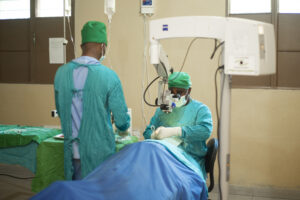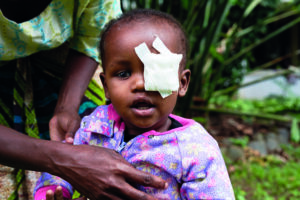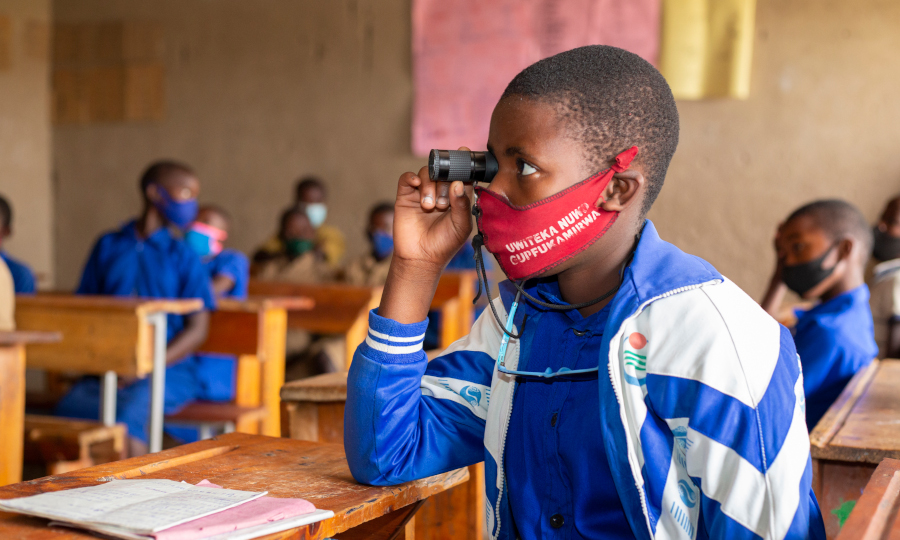2022 marks the beginning of our new five-year programme ‘Inclusive Vision’ approved by the Directorate-General for Development Cooperation and Humanitarian Aid (DGD). In DR Congo, Rwanda and Tanzania, Light for the World will further develop its activities in the sectors in which the NGO was invested before: eye care and inclusive as well as specialized education for blind and visually impaired children.
DR Congo
A new partner clinic
Until 2021, Light for the World’s activities were located in three southern provinces: Haut-Katanga, Lualaba, Kasaï Oriental. The new five-year programme for the DRC plans an extension of the NGO’s activities to a new province: Kasaï Central. Together with the local partner, we are going to establish a new eye clinic in the province, the Mulami Muimpe eye clinic in Kananga which will open its doors in 2023.
In total, the programme will support five eye clinics in the DRC which will acquire the status of provincial hospitals. An overall approach will allow them to enhance their medical and non-medical capacities, notably by means of setting up training courses for the medical and managerial staff, buying better quality equipment and medicines and digitalization.
Eye care in 10 health zones

© Sean Inc
In the five southern provinces covered by the programme, 10 health zones will be eligible for specific support, the goal being to allow the health centres and general hospitals to integrate eye care in their daily activities. The provincial partner hospitals which have the necessary expertise available, will be responsible for treating patients needing specialized care.
Training
Training remains one of the mainstays of Light for the World’s activities aiming at having available better skilled medical, paramedical and managerial staff. Moreover, the emphasis will be on hands-on, on the job training and on continuing training.
Eye care medicines
Light for the World aims at including the basic package of eye care medicines in the national system for procurement and distribution of medicines in the DRC. The central medicines procurement agency in Lubumbashi – Camelu – will become Light for the World’s partner and receive the necessary support to act as a pioneer in this field. Camelu shall ensure transparent and accountable purchase and distribution of quality eye care medicines, particularly to the partner clinics and the health zones.
Sharing of knowledge and expertise
Light for the World is sharing its experience, knowledge and expertise with other eye clinics and units in the DRC. St Joseph’s hospital in Kinshasa (Limete) is able to expand its eye care unit thanks to the cooperation with the Belgian NGO Rotary Clubs for Development (RC4D). St Joseph’s is a partner of RC4D and the latter provides for both the financial resources and the follow-up.
Inclusive education for visually impaired boys and girls
In the province of Haut-Katanga, we would like to extend inclusive education for visually impaired children from Lubumbashi to Likasi. That is why we are working hand in hand with the authorities and establishing a provincial platform for inclusive education. Together with the partner hospitals, concerned, the platform will develop a sustainable method to trace and assume responsibility for the education of visually impaired children. At least three ‘regular schools’ will be transformed into inclusive schools for visually impaired children. Adequate teaching materials and individual coaching are the keystones of the programme. And, last but not least, the programme provides for training and awareness-raising workshops about inclusion for the different education players (school principals, teachers, parents and children).
| EYE CARE | DGD Programme 22-26 | Clinics 22-26 |
| consultations | 441,700 | 545,486 |
| eye surgeries | 20,567 | 25,869 |
| pairs of glasses | 74,617 | 83,530 |
| health zones | 10 | 10 |
| medical, paramedical and administrative staff having completed formal training (diploma or certification) | 39 | 21 |
| among whom there are | 10 women | 12 women |
| INCLUSIVE EDUCATION FOR VISUALLY IMPAIRED CHILDREN AND YOUNGSTERS | DGD Programme 22-26 | |
| number of children and youngsters integrated through inclusive education | 614 | |
| among whom there are | 307 girls | |
| number of visually impaired children and youngsters having successfully completed their school cycle (successful completion of the final examination) | 282 | |
| among whom there are | 141 girls | |
| number of regular schools introduced to inclusive education | at least 3 pilot inclusive schools: | 2 in Lubumbashi and 1 in Likasi |
Rwanda
Reference and specialization
One of the new programme’s objectives is to enhance the role of the Kabgayi Eye Unit (KEU) as national reference centre for eye care. We will allow the staff to enhance their capacities and knowledge through a diploma or additional training in: paediatrics, low vision, retinal treatment, optometrics, orthoptics, glaucoma and retinoblastoma. The objective consists in enabling the KEU to provide specialized high-quality eye care to the population.
Training centre and decentralization
The clinic’s training centre will continue to develop by working out training modules for ophthalmologists, specialized eye care nurses (Techniciens Supérieurs en Ophtalmologie (TSO)), trainee TSOs and nurses. By 2026, 80 TSOs working in 38 district hospitals in Rwanda will attend three different additional training courses in Kabgayi: operating room assistant, paediatric emergencies and pathologies, refractive errors and low vision. This initiative has to be seen against the background of the decentralization of eye care. Improving both the quality and the quantity of eye care provided at district level should be envisioned as an opportunity to increase the accessibility of eye care for the population. Patients will be referred to the KEU whenever more complex and specialized treatment is required.
Eye care for the vulnerable population groups
Light for the World pays special attention to the most vulnerable population groups. In order to guarantee access to eye care for all patients, the KEU always provides treatment at reduced cost to the poorer patients. Mobile clinics and surgeries are also set up in the most remote district hospitals, refugee camps and prisons.
Inclusive and specialized education
The new programme aims to guarantee that a larger number of visually impaired children have access to inclusive education in four districts of the Southern Province. To that end, the area of operation of the Kabgayi Inclusive Education Unit, which until now only covered Catholic Schools, will be extended to all schools of the state education network – a total of 434 schools.
Workshops raising awareness about the inclusive approach will be organized for school principals, parents of visually impaired children, education agents and students – future teachers. Together with the authorities and other professionals involved, Light for the World intends to draw up a national strategy for inclusive education aimed at visually impaired children.
Light for the World will continue to support the school for blind and visually impaired children in Rwamagana. The school provides high quality specialized education to children with a visual impairment. Later on, the school will position itself as resource centre for inclusive education and will organize training courses for the itinerant teachers of the Kabgayi Inclusive Education Unit.
The KEU continues to take part in the educational project concerned. Its staff will conduct screenings in the 434 participating schools and in Rwamagana. Medical follow-up is planned for children with eye problems.
|
Key objectives 2022-2026:
|
Tanzania
Optimizing training centres
The 2022-2026 programme outlines an upscaling of the training capacity – as far as eye health is concerned – of the CCBRT and KCMC hospitals in the regions of Dar es Salaam and Moshi. The medical staff in charge of training will upgrade their skills and knowledge, particularly in the fields of low vision and optometry, through specialized training courses, visiting expert missions and experience sharing. Particular emphasis will be placed on the training of female staff. We provide upgraded or complementary materials to meet the training expectations.
Both training centres play an essential role in our strategy in Tanzania considering they will organize capacity-building workshops attended by the medical staff of the four other partner hospitals.
Eye care for children

As in Rwanda and the DRC, children with eye diseases are a priority target group of our programme in Tanzania. In the regions of Morogoro, Dodoma and Ruvuma, the paediatric services of the Benjamin Mpaka Hospital, the Morogoro Regional Hospital and St Joseph’s Hospital will be strengthened through training and equipment to allow them to reach the standards set for tertiary and secondary hospitals.
These units are destined to play the role of regional coordinators in the inclusive education programme. By 2026, they should be able to organize consultations, perform paediatric eye surgeries, and provide glasses and visual aids to visually impaired children.
They will also supervise the screening for eye diseases in schools. Children with eye problems will no longer have to go to Dar es Salaam for eye care.
Reference centre for inclusive education
Along with the activities aiming at strengthening its partner hospitals, Light for the World is striving to become a reference centre for the development of inclusive education for visually impaired children in Tanzania. The programme advocates for the right of those children to attend primary, secondary and vocational education. To that end, we attempt to raise the competent authorities’ awareness about the importance of inclusive education. We also aim at a better cooperation between the different actors (those in charge of education, itinerant teachers and hospitals) of the inclusive education programme in the regions of Morogoro, Dodoma and Dar es Salam.
The purpose is to organize a multidisciplinary follow-up for visually impaired children, meaning giving them a medical, educational and psychosocial support in order to allow these children to fully develop their potential.
|
Objectifs clés pour 2022-2026 :
|
Photo header: © Sean Inc
You can also support our projects in Africa! For example, donating 20 euros means that a visually impaired child can go to school during one month. Donate!
